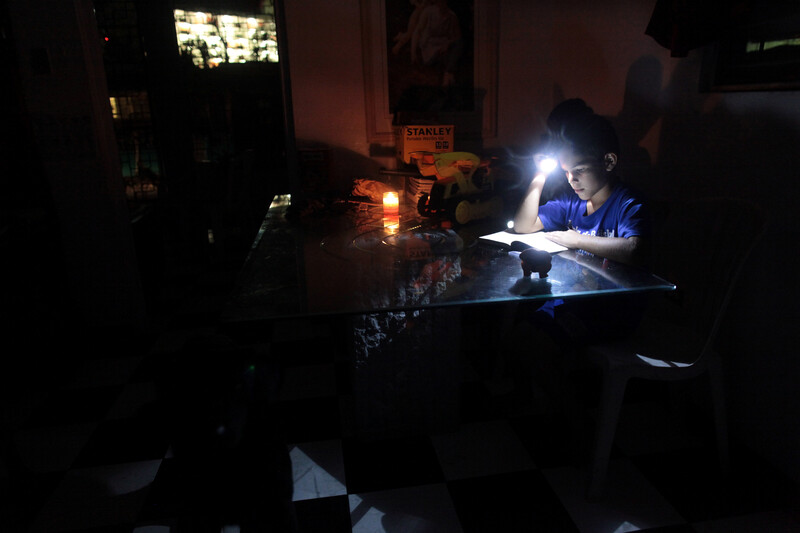Rights and Accountability 17 October 2017

Following Hurricane Maria, a girl reads using a flashlight in darkness in her home in Carolina, Puerto Rico, 28 September. Almost 90 percent of the island is still without power.
ReutersA Zionist satirical website, Mideast Beast, published an article during the 2016 US presidential election campaign caricaturing what the “Trump Solution” for the Palestine conflict would look like: move all Palestinians to Puerto Rico if they “surrender to Israel.”
With undisguised racist and Islamophobic contempt, the website demeans Palestinians and Puerto Ricans, treating them as throwaway people for colonial powers.
Now, weeks after two successive hurricanes hit Puerto Rico, the island looks a lot like the Gaza Strip has for the past decade.
“I know what it’s like to struggle with shortages of vital supplies such as electricity, gas, cash and safe water,” Tarneem Hammad, a young woman in Gaza, wrote in an open letter this month. “I know what it’s like to lose everything and have no place to go. I know what it feels like to hope that help will come – and it doesn’t.”
“It breaks my heart to know that the same crises that make life so difficult every day in Gaza (although here, they are all very much man-made) now are hurting you in Puerto Rico,” Hammad added. “As a Gazan, I have experienced the same pain and I wish that on no one.”
Approximately 84 percent of Puerto Rico lacks electricity, and almost 40 percent of people have no drinking water.
President Donald Trump has refused to extend a brief waiver lifting restrictions on foreign ships bringing food, fuel and medicine to Puerto Rico. The infrastructure has been devastated and the death toll from the hurricane has reached at least 45.
“While you are amusing yourself throwing paper towels at us, your compatriots and the world are sending love and help our way,” Carmen Cruz, the mayor of Puerto Rico’s capital San Juan, wrote in a searing message addressed to Trump.
She accused the president of “Condemn[ing] us to a slow death of non-drinkable water, lack of food, lack of medicine while you keep others eager to help from reaching us.”
Some of the headlines coming out of Puerto Rico could just as well be coming from Gaza:
Uninhabitable
Gaza is rapidly becoming “unlivable,” according to a recent UN report.
An 11-year-old in Gaza does not know a world where electricity is available for more than a few hours a day. More than 96 percent of Gaza’s water is unsafe for drinking. With waste treatment out of commission in Gaza, raw sewage is being dumped into the Mediterranean.
That’s also catastrophic for Gaza’s fishermen, whom the Israeli military restrict to an area within six nautical miles from the shore.
Over the last decade, Israel has also systematically restricted shipments of food, fuel, medicine and building supplies into Gaza, at one point even counting the minimum calories that each person could consume without starving, and severely hampering reconstruction after multiple Israeli invasions that leveled entire neighborhoods and killed thousands of Palestinians.
A US colony
Despite federal government aid, Puerto Rico will have to adjust to a new way of life without electricity for a long period of time.
Ricardo Ramos, CEO of the Puerto Rico Electric Power Authority, described the damage to the electrical grid as “catastrophic.”
“It’s a good time for dads to buy a ball and a glove and change the way that you entertain your children – the way you’re going to go to school, the way that you’re going to cook, with gas stoves rather than electric,” Ramos added.
Even before the catastrophic hurricanes, the island was already struggling under a massive debt crisis.
Trump did not lie when he said that Puerto Rico’s infrastructure was already devastated before the hurricane.
According to journalist Juan González, the burden of unpayable debt has its roots in US colonial policies towards the island, and is thus also a human-made crisis.
Puerto Rico’s people are at the mercy of decisions from Washington in which they have no say or control. Although much media coverage has emphasized that Puerto Ricans are US citizens, unlike other Americans, they have no voting members in Congress and they do not vote in presidential elections.
“It may be easy to try to disregard us,” San Juan mayor Cruz said. “It may be easy because we’re a US territory and a colony of the United States.”
“Slow death”
The crisis in Gaza is also human-made: the result of a decade-long Israeli siege backed by the US and the rest of the so-called international community.
Cruz calling Puerto Rico’s fate a “slow death” echoes the language often used to describe life in Gaza under Israel’s blockade.
For years, Gaza has suffered amid international near-silence, except when the catastrophe becomes difficult to hide, such as during Israel’s 2014 summer assault that killed more than 2,200 Palestinians.
But since then, the situation in Gaza has been obscured as an abstract political conflict, making it easier to ignore.
Inadequate though it may be, there has been an intense focus on Puerto Rico because of the hurricanes. But Puerto Rico was already struggling long before the current crisis, and that will continue after it fades from the headlines. And so we must do our best to ensure that the spotlight remains on both situations.
What connects the crises in Gaza and Puerto Rico is not just the enormous human suffering, but their causes: while one is presented as a “natural” disaster, and the other “political,” both are rooted in the injustice that the basic rights of millions of people are ignored or denied by the unaccountable colonial powers that control their fates.





Comments
solidarity
Permalink Eric replied on
Perhaps Gazans could send some practical advice on how to cope.
Colonialismo
Permalink Claudio Raúl Cruz Núñez replied on
Saludos. Estoy completamente de acuerdo con usted. Ambos territorios están viviendo el colonialismo más crudo y repugnante.